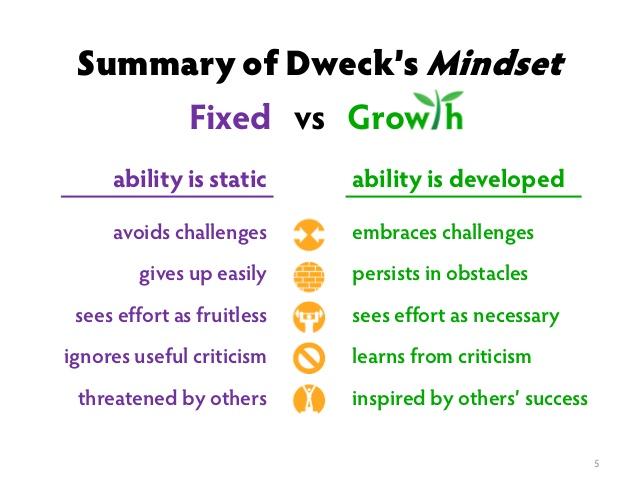Lou Holtz knows a thing or two about personal growth. He is the only college football head coach to lead six different Division 1 programs to bowl games and is a recent inductee of the College Football Hall of Fame.
“In this world,” he said once, “you’re either growing, or you’re dying. So get in motion and grow.”
In other words, self-improvement––or subscribing to a growth mindset––is imperative.
What is a growth mindset
But what exactly is a growth mindset? A growth mindset is a sincere belief that one’s abilities are not set in stone. That talent can be nurtured; that intelligence can be fostered; and that creativity and leadership can be developed. It’s something you must possess, in other words, if you ever truly want to reach your potential.
Find your next investor with Crunchbase Pro. Start your free trial today.
It’s for this reason that in every company I’ve managed, I’ve done my best to help my employees develop and sustain growth mindsets of their own.


But this, as I’ve learned, is harder than it might seem. To inspire growth mindsets within your employees, your company itself must have an organizational growth mindset. The foundation of your company’s culture should be based on the importance of constant growth and self-improvement.
How to integrate a growth mindset into your company culture
Stanford University researcher Carol Dweck has done extensive work identifying why exactly this is so challenging.
In her book Mindset: The New Psychology of Success, she details two mindsets both people and organizations can develop: the “fixed mindset” and the “growth mindset.” Fixed-mindset individuals, she finds, believe their basic abilities and attributes are static. They spend their time and energy maintaining the status quo and minimizing their mistakes. People and organizations with growth mindsets, meanwhile, see their talents and abilities as works-in-progress. They’re more likely, as a result, to work harder and more purposefully at self-improvement.
As it turns out, most of us are guilty of having fixed mindsets in many aspects of our lives.
That’s true for the companies we run, too. And the problem, of course, is that a company focused only on maintaining the status quo stagnates. They don’t grow, nor do they attract or keep the most talented or inspired people who tend to gravitate toward growth opportunities.
4 steps to develop a growth mindset for your company and employees
It’s crucial, then, for founders, company leaders, and team managers to work consciously to develop and sustain growth mindsets in our employees, ourselves, and in our organizations––a task that requires actively combating complacency and our less-productive tendencies at every managerial level.
Here are some ways I’ve learned at BookBaby to do exactly that.
1. Seek out learners
Building a culture which prioritizes and appreciates growth starts by recruiting, selecting, and retaining employees who themselves possess a growth mindset.
How do you spot these folks? Resumes are useful, of course, as are personality tests like the Caliper, which we use. But what typically nets the best results is talking to applicants’ references and asking specifically about their drive to improve. When we identify folks who have in the past exhibited a genuine commitment to learning, we, in turn, commit to them.
The reason is simple: the more folks you bring on to your company who themselves harbor an individual commitment to self-development will more seamlessly and effectively participate in a culture committed to development and growth. They, in turn, will sustain and reinforce the type of company ethos required of growth and, ultimately, success.
2. Encourage new project assignments
At BookBaby, once employees have been onboarded, our managers work one-on-one to help each individual improve their abilities, advance in their roles, take on more leadership opportunities, and more generally evolve their thinking.
But we also lead by example. Although BookBaby has grown immensely over the last few years, I’m always looking for opportunities to stretch and showcase our staff’s hidden skills. In 2017, that manifested is us hosting our first ever Independent Writer’s Conference. No one on the team had experience putting such an event together. But we thought it would be advantageous both to the company and our clients, so with a bit of consulting help, we set forth to make it happen.
Employees from every area of the company––marketing, sales, production, design––came together in weekly meetings to plan the big event, which we held here in Philadelphia. All told, we probably invested over 1,500 man hours to pull it off, but it was worth it. We ended up hosting over 400 authors, speakers, and bloggers. And everyone on staff who helped make it happen––although they were pulled slightly from their normal jobs––in the process developed new leadership and project management skills, along with a new sense of confidence.
We’re getting ready to host our third IWC this year. It stands out to me now as an example of what can happen when you commit tangibly across every level of your company to growing together.
Maintaining a growth mindset requires more than just lip service.
3. Build a culture that rewards risk-taking and doesn’t criminalize failure
Getting a bit more into the nuts and bolts, to foster a growth mindset throughout your company’s DNA, you need to actively encourage and incentivize risk-taking and personal development.
That also means, however, setting a certain cultural expectation that is lenient of mistakes and errors, which are sort of inevitable when you encourage employees to take risks or shoulder increased leadership opportunities.
This requires a fine balance. As a company leader, you don’t want your people to make potentially costly mistakes. If people are incentivized to play it safe innovation, creativity, and growth will be hindered.
4. Channel growth mindsets into a communal quest for excellence
At the end of the day, companies who themselves have organizational growth mindsets do so because their employees not only feel enabled to grow and learn––but inspired to.
So, how can you motivate your people to that end?
Incentives, as mentioned above, certainly play a role. Motivation should be more genuinely tied to the success of the company and the inherent value of doing great, hard work. Encourage employees to take chances, come up with creative means of solving challenging problems, and to design their own growth paths––and frame it all as important to this end of driving the company forward. Innovation and success are natural outcomes of growth, boundary-pushing, development, and risk-taking.
A growth mindset, ultimately, is the mindset required of becoming the best at whatever it is you do. That goes for companies as well as individuals. If your people genuinely believe that, they will want to sustain their own growth mindsets. And ultimately, your company will naturally cultivate and develop its own, too.
Steven Spatz is a writer, marketer, and the President of BookBaby, the nation’s leading eBook and printed book distributor. Headquartered just outside Philadelphia, BookBaby offers a full stack solution for self-published authors around the globe. Steven loves to hear from authors, editors, and publishers with tales of publishing trials and triumphs. Contact him at steven@bookbaby.com.


